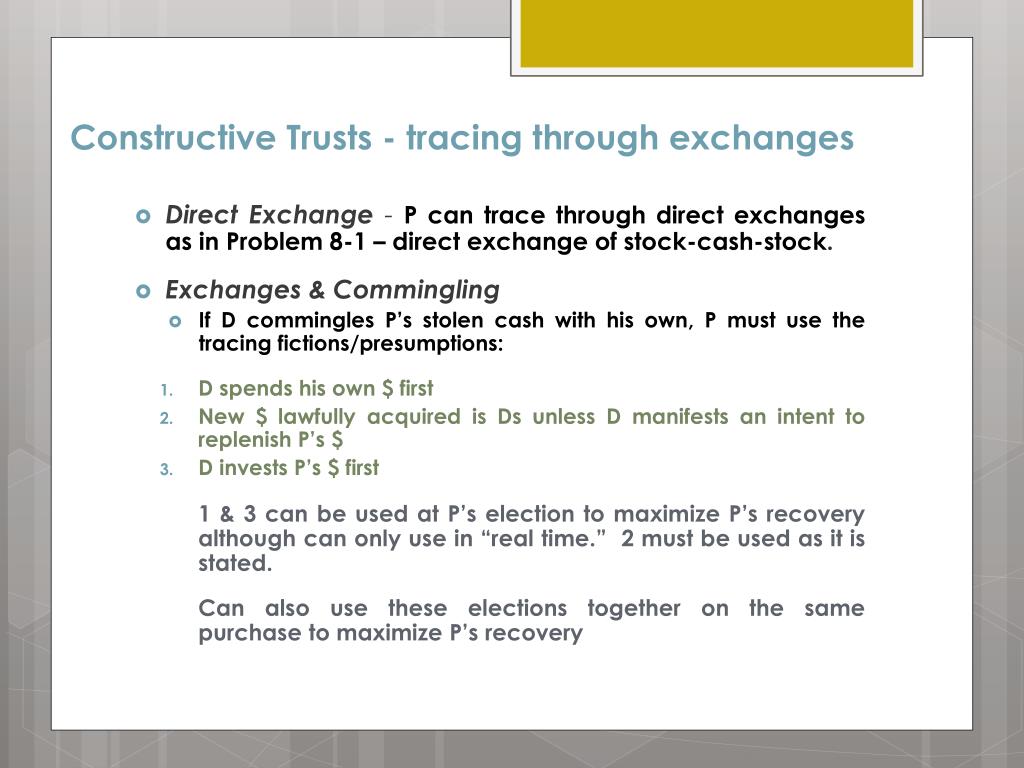What Links What Is A Constructive Trust and Unjust Enrichment
What Links What Is A Constructive Trust and Unjust Enrichment
Blog Article
Exploring Exactly How Does a Useful Count On Operate In Home and Possession Disputes
The concept of a useful depend on serves as a vital system within property and possession disagreements, addressing scenarios where one party has unjustly benefited at the expense of an additional. This fair remedy not only looks for to correct oppressions however also emphasizes the relevance of intent and payment in figuring out rightful ownership. By examining the subtleties of exactly how constructive depends on operate, one can discover the intricacies that typically arise in lawful contexts. What implications do these counts on hold for future disagreements, and how might they affect the landscape of home regulation?

Interpretation of Constructive Trust Fund
A useful trust emerges when a court figures out that it is required to stop unjust enrichment, usually in circumstances where a party has gotten residential or commercial property via wrongful means or under circumstances that necessitate fair alleviation. This lawful remedy is not formally developed by the events entailed; rather, it is imposed by the court to address situations where justness and justice demand intervention.
Useful depends on are often conjured up in cases involving scams, violation of fiduciary responsibility, or other kinds of misbehavior. If an individual wrongfully takes possession of residential or commercial property that rightfully belongs to one more, the court may impose a useful depend on to make sure that the offender holds the building for the benefit of the rightful proprietor. This legal principle operates the concept that it would be inequitable for the crook to maintain the benefits originated from their transgression.
Inevitably, a positive count on serves as an effective tool in residential property disagreements, reinforcing the concept that possession ought to show not just lawful title yet also ethical considerations. By identifying the demand for fair alleviation, courts guarantee that justice dominates in the circulation of home and assets.
Trick Principles of Useful Trusts
While the application of constructive trust funds might differ relying on specific circumstances, a number of vital concepts continually underpin their enforcement in property disputes. The principle of unjust enrichment plays a critical role; a positive count on is often imposed to protect against one party from unfairly profiting at the expenditure of another. This concept emphasizes the equitable nature of useful trust funds, emphasizing that lawful possession does not always equate to rightful possession.
Second of all, the requirement of a fiduciary relationship is considerable. What Is A Constructive Trust. Positive trusts often emerge in contexts where one party has a task to act in the best interests of one more, such as in collaborations or joint ventures. Violations of this duty can activate the charge of a constructive depend protect the hurt event's interests
Additionally, the teaching of intention is essential, as courts take into consideration whether the events meant to develop a trust-like connection, also if not formally recorded. Lastly, the principle of fair treatments highlights that constructive trust funds offer to provide relief that lines up with fairness and justice, ensuring that the rightful complaintant can reclaim residential property or possessions that they are qualified to, in spite of legal title living elsewhere.
Applications in Home Disputes
Positive counts on locate considerable application in residential or commercial property disputes, specifically when dealing with issues of possession and equitable legal rights. These trusts emerge in scenarios where one celebration holds residential or commercial property under problems that, in justness and justice, should profit another party. The fair solution of a useful trust prevents unjust enrichment by identifying the contributions of a party that, regardless of lacking official title, has a genuine case to the residential property.
One common situation entails cohabiting partners that add to the purchase or maintenance of property however are out the title act. In such situations, the courts might enforce a useful depend reflect the celebrations' objectives and contributions, thus guaranteeing that the non-titled partner receives a fair share of the residential or commercial property.
In addition, positive trusts can be vital in disagreements involving inheritance or household residential property, where a decedent's intent might not have actually been formally recorded. Courts might presume a constructive depend honor the decedent's desires and fix prospective injustices among heirs. Overall, constructive depends on act as an essential device in harmonizing rights and making sure equitable end results in residential or commercial property conflicts, reinforcing the principle that fairness should prevail in ownership issues.
Instance Studies and Examples
Residential or commercial property disputes entailing positive trusts can commonly be shown through real-life study that highlight the intricacies and subtleties pop over to this site of fair legal rights. One noteworthy case is * Gissing v. Gissing *, where a wife claimed a helpful rate of interest in the family home, saying that her monetary contributions during the marital relationship called for a constructive trust fund. The court inevitably ruled in her favor, establishing that her payments produced a fair rate of interest in spite of the residential property being exclusively in her husband's name.
An additional illustrative instance is * Thompson v. Thompson *, where brother or sisters disputed the possession of a family estate after their moms and dads' death. One sibling had actually maintained and boosted the home, insisting that these activities justified a useful trust. The court acknowledged the brother or sister's efforts and found that a useful trust was required to stop unfair enrichment, thus granting them a share in the estate.
These cases exemplify just how constructive trust funds offer to deal with situations where legal ownership does not reflect truth equitable rate of interests of the parties included, highlighting the importance of intent and contributions in identifying rightful cases in building disputes.
Legal Implications and Considerations
Many lawful implications and considerations emerge when addressing useful rely on residential or commercial property conflicts. Foremost, the facility of a useful depend on typically depends upon the existence of an unjustified enrichment, in which one celebration benefits at the expenditure of one more. This principle necessitates a complete evaluation of the connection between the parties and the situations that resulted in the alleged injustice.
In addition, courts usually require clear proof of the complaintant's payment to the property or asset concerned, which can include financial investments, labor, or other forms of assistance. The burden of proof relaxes with the plaintiff, necessitating precise paperwork and statement to validate their insurance claims.
In addition, the timing of claims is important, as laws of constraints may limit the capacity to establish a constructive depend on after a certain period. Legal advise needs to navigate these time restrictions meticulously to make certain that cases are submitted in a timely fashion.
Last but not least, the capacity for disputes over the intent behind residential property transfers can make complex issues better, necessitating a nuanced understanding of both legal legislation and situation legislation to efficiently advocate for a customer's interests in constructive trust insurance claims.
Final Thought

The concept of a useful trust serves as a vital mechanism within residential property and property conflicts, addressing circumstances where one party has actually unfairly benefited at the cost of another. If a specific wrongfully takes ownership of home that rightfully belongs to one more, the court may Source enforce a useful count on to make sure that the wrongdoer holds the home for the advantage of the rightful owner.Useful depends on locate substantial application in property conflicts, especially when attending to concerns of possession and equitable legal rights. Overall, useful trust funds serve as a vital tool in balancing rights and making sure equitable end results in building conflicts, enhancing the concept that justness should dominate in possession issues.
In recap, positive trusts serve as crucial equitable Continued treatments in residential or commercial property and possession conflicts, addressing unjustified enrichment by acknowledging the contributions of events included. - What Is A Constructive Trust
Report this page